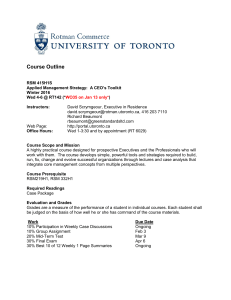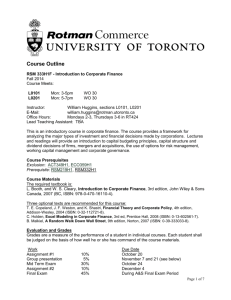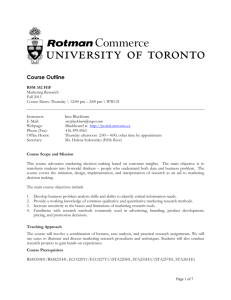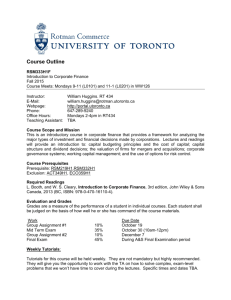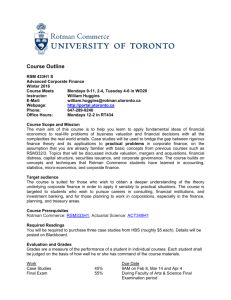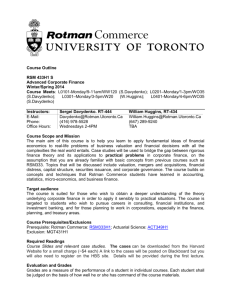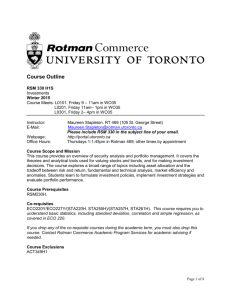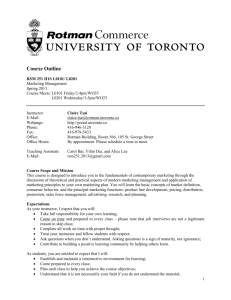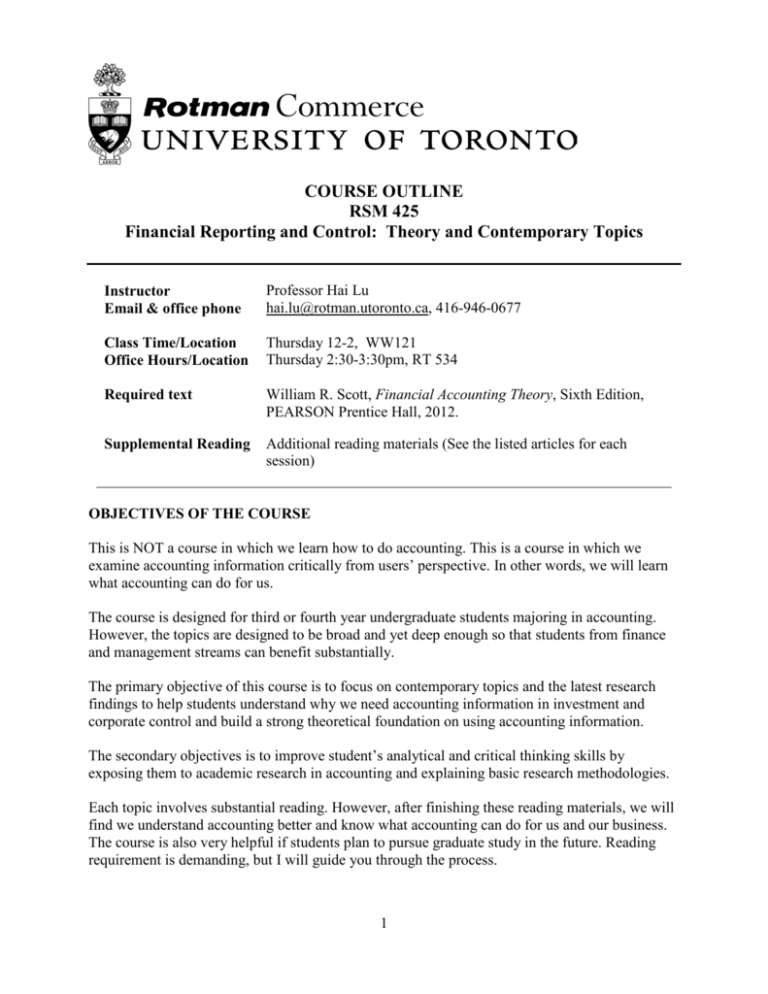
COURSE OUTLINE
RSM 425
Financial Reporting and Control: Theory and Contemporary Topics
Instructor
Email & office phone
Professor Hai Lu
hai.lu@rotman.utoronto.ca, 416-946-0677
Class Time/Location
Office Hours/Location
Thursday 12-2, WW121
Thursday 2:30-3:30pm, RT 534
Required text
William R. Scott, Financial Accounting Theory, Sixth Edition,
PEARSON Prentice Hall, 2012.
Supplemental Reading
Additional reading materials (See the listed articles for each
session)
OBJECTIVES OF THE COURSE
This is NOT a course in which we learn how to do accounting. This is a course in which we
examine accounting information critically from users’ perspective. In other words, we will learn
what accounting can do for us.
The course is designed for third or fourth year undergraduate students majoring in accounting.
However, the topics are designed to be broad and yet deep enough so that students from finance
and management streams can benefit substantially.
The primary objective of this course is to focus on contemporary topics and the latest research
findings to help students understand why we need accounting information in investment and
corporate control and build a strong theoretical foundation on using accounting information.
The secondary objectives is to improve student’s analytical and critical thinking skills by
exposing them to academic research in accounting and explaining basic research methodologies.
Each topic involves substantial reading. However, after finishing these reading materials, we will
find we understand accounting better and know what accounting can do for us and our business.
The course is also very helpful if students plan to pursue graduate study in the future. Reading
requirement is demanding, but I will guide you through the process.
1
Prerequisites: RSM 221H1, RSM 222H1, RSM 332H1
Co-Requisites: RSM 333H1
If you drop RSM 333H1 (the co-requisite) during the academic term, you must also drop this course.
Contact Rotman Commerce Academic Program Services for academic advising if needed.
GRADE DETERMINATION
Quiz
Class participation and homework
Mid-term test
Research project
Total
15%
15%
40%
30%
100%
REQUIREMENTS
Quizzes
There are assigned reading materials for each session. You are asked to read the textbook chapter
and articles assigned in advance. Starting from the second week, you will have a small quiz or a
homework assignment each week. The quizzes are designed to test your general understanding of
the reading materials. There are seven quizzes in total. There will be no make-up quizzes, but you
will be allowed to drop two quizzes with the lowest marks. The remaining five quizzes account
for 15% of course mark.
Class Participation and Homework
The primary goal of the individual participation portion of the grade (5%) is to reward you for
your preparation and individual contributions to the learning environment. It includes but is not
limit to attendance, asking and answering questions, etc..
I will ask you write up and submit a summary of the article(s) assigned. Homework accounts for
10% course mark and will be graded by efforts.
Term Test
The term test will be held in class on February 27. It will be one hour and forty-five minutes
long.
Research Project
Student can either complete the project independently or form a group with 2-3 students.
The research project has to be related to the topics covered in class. You are expected to review
the related literature, highlight research questions, and use data/analyses to justify your answers
in your final research report. More details will be given before the term test. The assignment is
due in hard copy in class on April 2.
2
Learning to work together in teams is an important aspect of your education and preparation for
your future careers. That said, project-based teamwork is often new to students and you are
therefore reminded of the following expectations with respect to behaviour and contributions to
your team project.
1. Read the document entitled, “Working in Teams: Guidelines for Rotman Commerce Students”
which is available on the RC portal under the Academic Services tab.
2. When working in a team, Rotman Commerce students are expected to:
•
•
•
•
•
Treat other members with courtesy and respect;
Honour the ground rules established by the team;
Contribute substantially and proportionally to the final project;
Ensure enough familiarity with the entire contents of the group project/assignment so as to
be able to sign off on it as original work;
Meet the project timeline as established by the team.
3. Resolving differences:
Conflicts can – and do – occur. Conflicts are part of the team’s process of learning how to work
together effectively and can actually generate exciting debate and creative solutions – if managed
appropriately.
Student teams are collectively expected to resolve disputes or misunderstandings as soon as they
arise (and prior to submission of the final project). In cases where teams are unable to reach a
mutually agreeable solution, the entire team must meet with the Rotman Commerce Team
Coach** as soon as possible. The Coach will listen to the team and help develop options for
improving the team process. All members of the project team must commit to, and, utilize their
action plans.
** The Rotman Commerce Team Coach, Nikoleta Vlamis, may be reached at
nikoleta@nikoletaandassociates.com for an appointment. Nikoleta is an expert in team dynamics
and facilitation. Note that Nikoleta’s role is to provide guidance, support and advice on team
matters – not to formally evaluate or assess teamwork for academic purposes.
POLICY AND PROCEDURE
Missed Tests and Assignments (including midterm examinations)
Students who miss a test or assignment for reasons entirely beyond their control (e.g. illness) may
submit a request for special consideration. Provided that notification and documentation are
provided in a timely manner, and that the request is subsequently approved, no academic penalty
will be applied.
In such cases, students must notify Rotman Commerce on the date of the missed test (or due date
in the case of course work) and submit supporting documentation (e.g. Verification of Student
Illness or Injury form) to the Rotman Commerce Program Office within 48 hours of the
originally scheduled test or due date. Students who do not provide Rotman Commerce or the
instructor with appropriate or sufficient supporting documentation will be given a grade of 0
(zero).
3
Note that the physician’s report must establish that the patient was examined and
diagnosed at the time of illness, not after the fact. Rotman Commerce will not accept a
statement that merely confirms a report of illness made by the student and documented by
the physician.
For students who miss the term test but follow the above procedures, a make-up exam will be
offered.
Late Assignments
No late assignments will be accepted. Students who, for reasons beyond their control, are unable
to submit an assignment by its deadline must obtain approval from the instructor for an extension.
Supporting documentation will be required as per the policy on missed tests and assignments.
Accessibility Needs
The University of Toronto is committed to accessibility. If you require accommodations for a
disability, or have any accessibility concerns about the course, the classroom or course materials,
please contact Accessibility Services as soon as possible: disability.services@utoronto.ca or
http://www.accessibility.utoronto.ca/.
Academic Integrity
Academic Integrity is a fundamental value essential to the pursuit of learning and scholarships at
the University of Toronto. Participating honestly, respectively, responsibly, and fairly in this
academic community ensures that the UofT degree that you earn will continue to be valued and
respected as a true signifier of a student's individual work and academic achievement. As a result,
the University treats cases of academic misconduct very seriously.
The University of Toronto’s Code of Behaviour on Academic Matters
http://www.governingcouncil.utoronto.ca/policies/behaveac.htm outlines the behaviours that
constitute academic misconduct, the process for addressing academic offences, and the penalties
that may be imposed. You are expected to be familiar with the contents of this document.
Potential offences include, but are not limited to:
In papers and assignments:
• Using someone else's ideas or words without appropriate acknowledgement.
• Submitting your own work in more than one course without the permission of the
instructor.
• Making up sources or facts.
• Obtaining or providing unauthorized assistance on any assignment (this includes
collaborating with others on assignments that are supposed to be completed individually).
On test and exams:
• Using or possessing any unauthorized aid, including a cell phone.
• Looking at someone else's answers
• Misrepresenting your identity.
• Submitting an altered test for re-grading.
Misrepresentation:
• Falsifying institutional documents or grades.
4
•
Falsifying or altering any documentation required by the University, including (but not
limited to), medical notes.
All suspected cases of academic dishonesty will be investigated by the following procedures
outlined in the Code of Behaviour on Academic Matters. If you have any question about what is
or is not permitted in the course, please do not hesitate to contact the course instructor. If you
have any questions about appropriate research and citation methods, you are expected to seek out
additional information from the instructor or other UofT resources such as College Writing
Centres or the Academic Success Centre.
Email
At times, the course instructor may decide to communicate important course information by
email. As such, all UofT students are required to have a valid UTmail+ email address. You are
responsible for ensuring that your UTmail+ email address is set up AND properly entered on the
ROSI system. For more information please visit http://help.ic.utoronto.ca/category/3/utmail.html
Forwarding your utoronto.ca email to a Hotmail, Gmail, Yahoo or other type of email account is
not advisable. In some cases, messages from utoronto.ca addresses sent to Hotmail, Gmail or
Yahoo accounts are filtered as junk mail, which means that important messages from your course
instructor may end up in your spam or junk mail folder.
Blackboard and the Course Page
The online course page for this course is accessed through Blackboard. To access the course
page, go to the UofT Portal login at https://portal.utoronto.ca/ and log in using your UTORid and
password. Once you have logged in, look for the My Courses module where you’ll find the link
to all your course websites. If you don’t see the course listed here but you are properly registered
for the course in ROSI, wait 48 hours. If the course does not appear, go to the Information
Commons Help Desk in Robarts Library, 1st floor, for help, or explore the Portal Information and
Help at www.portalinfo.utoronto.ca/students and review the Frequently Asked Questions.
RECORDING LECTURES
Lectures and course materials prepared by the instructor are considered by the University to be an
instructor’s intellectual property covered by the Canadian Copyright Act. Students wishing to
record a lecture or other course materials in any way are required to ask the instructor’s explicit
permission, and may not do so unless permission is granted (note: students who have been
previously granted permission to record lectures as an accommodation for a disability are, of
course, exempted). This includes tape recording, filming, photographing PowerPoint slides,
blackboard materials, etc.
CONDUCT OF CLASSES AND EXPECTATIONS
Classes will begin at ten minutes after the hour, in accordance with university policy. Students
are expected to arrive on time so as not to disrupt the class.
5
Theory of Financial Reporting and Control: Contemporary Topics
TENTATIVE COURSE OUTLINE
Class Date
Topic
Class 1,
January 9
Overview
Materials Covered
• Objective of the course
• Historical perspective of accounting
• Complexity of financial reporting and regulations
• Fundamental problem of financial accounting theory
• Accounting standard setting and accounting research
• New challenges of accounting practice (using accounting scandals to
discuss those challenges)
Readings: Chapter 1 of Textbook
Class 2,
January 16
Financial Reporting for
Decision Making
•
•
•
•
•
Accounting under ideal conditions
Accounting under information uncertainty
Decision usefulness approach
Reaction of professional accounting bodies to decision approach
Decision usefulness for managers, analysts, and investors
Readings: Chapters 2 and 3 of textbook.
Additional Readings:
1) CPA Canada Handbook Part 1: The conceptual framework for financial
reporting (Available at Rotman BIC online).
2) FASB Statement of Financial Accounting Concepts No. 2 - Qualitative
Characteristics of Accounting Information (Figure 1 and related
discussions). (www.fasb.org/pdf/aop_CON2.pdf).
3) The Ability of Earnings to Predict Future Operating Cash Flows Has
Been Increasing – Not Decreasing. Myungsun Kim and William Kross,
Journal of Accounting Research 2005, 43: 753-780.
6
Class 3,
January 23
Efficient Securities Market and
Implications
•
•
•
•
•
Efficient Market Hypothesis
Implications of Efficient Markets for Financial Reporting
Informativeness of Stock Price and Information Asymmetry
Social Significance of Securities market that work well
A case of misleading disclosure (2002 Global Settlement Case)
Readings: Chapter 4 of textbook.
Additional Readings:
1) Understanding Asset Prices - Scientific Background on 2013 Nobel Prize in
Economics, Royal Swedish Academy of Science.
2) Market Efficiency and Accounting Research: A Discussion of ‘Capital Market
Research in Accounting’ by S.P. Kothari. Charles Lee. Journal of Accounting
and Economics 2001, 31: 233-253.
3) Wealth Transfer Effects of Analysts’ Misleading Behavior. Gus De Franco, Hai
Lu, and Florin Vasvari. Journal of Accounting Research 45: 71-110.
Class 4,
January 30
Information-based Financial
Accounting Theory
•
•
•
•
Event studies
Earnings response coefficients
Information content of financial statement information
A Caveat about the “Best” Accounting Policy
Readings: Chapter 5 of textbook
Additional Readings:
1) Empirical Evaluation of Accounting Income Numbers. Ray Ball and
Philip Brown. Journal of Accounting Research 1968, 6: 159-178.
2) The Supraview of Return Predictive Signals. Jeremiah Green, John
Hand, and Frank Zhang. Review of Accounting Studies 2013: 692-730.
Class 5,
February 6
Measurement-based Financial
Accounting Theory
•
•
•
•
Efficient securities market: Revisit
Accounting anomalies and behavioral finance
Value relevance of financial statement information
Valuation model
7
•
Measurement applications (financial statement items)
Readings: Chapters 6 and 7 of textbook.
Additional Readings:
1) Including Estimates of the Future in Today’s Financial Statements.
Mary Barth. Accounting Horizons 2006: 271-285.
2) How Can Accounting Researchers Become More Innovative? Sudipta
Basu. Accounting Horizon 2012: 851-870.
Class 6,
February 13
Positive Accounting Theory
(PAT) & Data Analysis
•
•
•
•
Outline of Positive Accounting Theory
Three hypotheses of PAT (bonus plan, debt covenant, and political cost
hypothesis)
Accounting choice and empirical PAT research
How to extract financial accounting and stock market information from
WRDS (Introduction for preparing group project)
Readings: Chapter 8 of textbook.
Additional Readings
1) The Role of Accounting Theory, Chapter 1 of Watts and Zimmerman’s
Book “Positive Accounting Theory”
2) Positive Accounting Theory: A Ten Year perspective. Ross Watts and
Jerold Zimmerman, The Accounting Review 1990.131-156.
February 17-21, Reading Week, No Classes
Class 7,
February 27
Class 8,
March 6
Conflict of Interests and
Management Control
Mid-Term Test : Cover the materials in Lectures 1-6
• An overview of agency theory
• An analysis of conflict: Agency theory and management control
• Accounting numbers in contracting
• Discussion on group projects
Readings: Chapter 9 (9.4-9.10) and Chapter 10 of textbook.
8
Additional Readings:
1) Are CEOs Overpaid? Marcel Cote, CA Magazine 2007 November.
2) Executive Equity Compensation and Incentives: A Survey. John Core,
Wayne Guay, and David Larcker, 2003. FRBNY Economic Policy Review,
April: 27-50.
3) The Economics of Conflicts of Interest in Financial Institutions. Hamid
Mehran and Rene Stulz. Journal of Financial Economics 2007, 85: 267296.
Lecture 8 will also cover the requirements of group project and discussions on
data preparation.
Class 9,
March 13
Applications of Agency
Theory:
Cases on Behavior of Analysts,
Short Sellers, and Managers
•
•
•
•
Empirical compensation research
Motivations of earnings management
Empirical earnings management
Cases on behavior of market participants: Financial analysts, short
sellers, and managers.
Readings: Chapter 11 of textbook.
Additional Readings:
1) Undermining Staying Power: The Role of Unhelpful Management
Theories. Roger Martin, Rotman Magazine, Spring 2009.
2) How Are Earnings Managed? Example from Auditors. Mark Nelson, John
Elliott, and Robin Tarpley. Accounting Horizons 2003. 17: 17-35
3) Academic Articles supporting the findings presented in in-class slides.
Class 10,
March 20
Financial Frauds and
“Lemons” Market
•
•
•
•
•
Information asymmetry
Costs of dishonesty
Counteracting institutions and market mechanism
Cases of misrepresentation of financial statements on some Chinese
firms listed in the U.S. and Canada.
Regulations
9
Readings:
1) Screening of the documentary Enron: The Smartest Guys in the Room.
2) The Market for ‘Lemons’: Quality, Uncertainty and the Market Mechanism.
George Akerlof, Quarterly Journal of Economics 1970, 84: 488-500.
3) The Market for “Lemons”: A Study of Quality Uncertainty and the Market
Mechanism for Chinese Firms Listed in the US. Randolph Beatty, Hai Lu,
and Wei Luo, working paper, 2013.
Class 11,
March 27
New Challenges on
Information Sharing: Social
Network
•
•
•
•
Regulation Fair Disclosures
Expert network and insider trading
Information sharing and leakage through network
Network and private equity in emerging market.
Readings:
1) Final Rule: Selective Disclosure and Insider Trading. Securities and
Exchange Commission. http://www.sec.gov/rules/final/33-7881.htm
2) Expert Network, Galleon’s Web, Wall Street Journal Online.
Insider Case Lands Big Catch, June 15, 2012. Wall Street Journal.
The Man Who Wired Silicon Valley, December 30, 2009. Wall Street
Journal.
3) The small world of investing: Board connections and mutual fund returns.
Lauren Cohen. Andrea Frazzini, and Christopher Malloy, Journal of
Political Economy 2008. 116 (5): 951-979.
Class 12,
April 2
Discussions on Research
Project and Review
Comment on sample student research projects and review what we have
learned.
Summarize key points on What Accounting Can Do For You: Investment,
Corporate Control,… Accounting is More Than Just Book Keeping.
10

